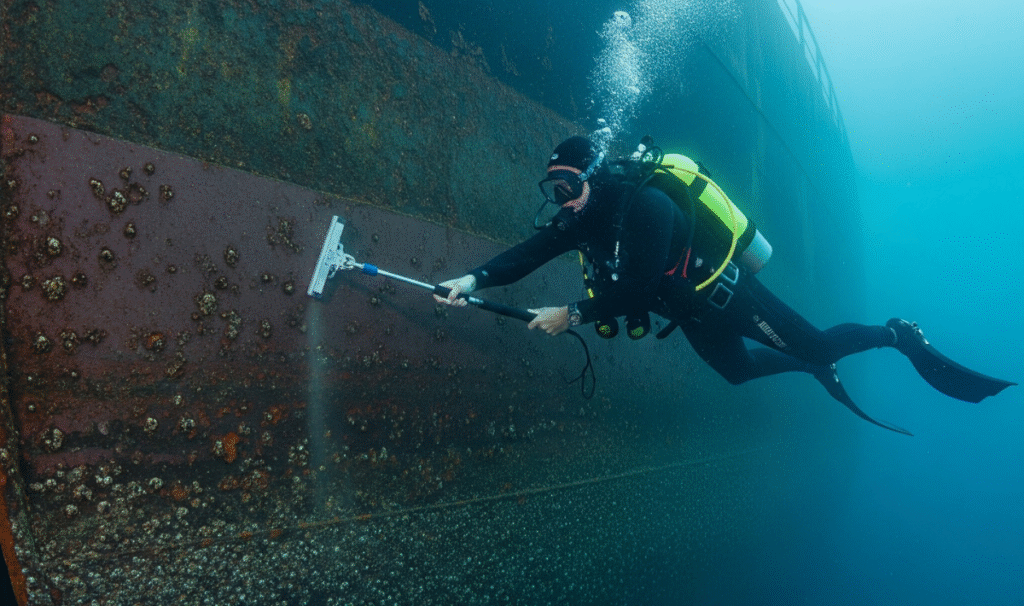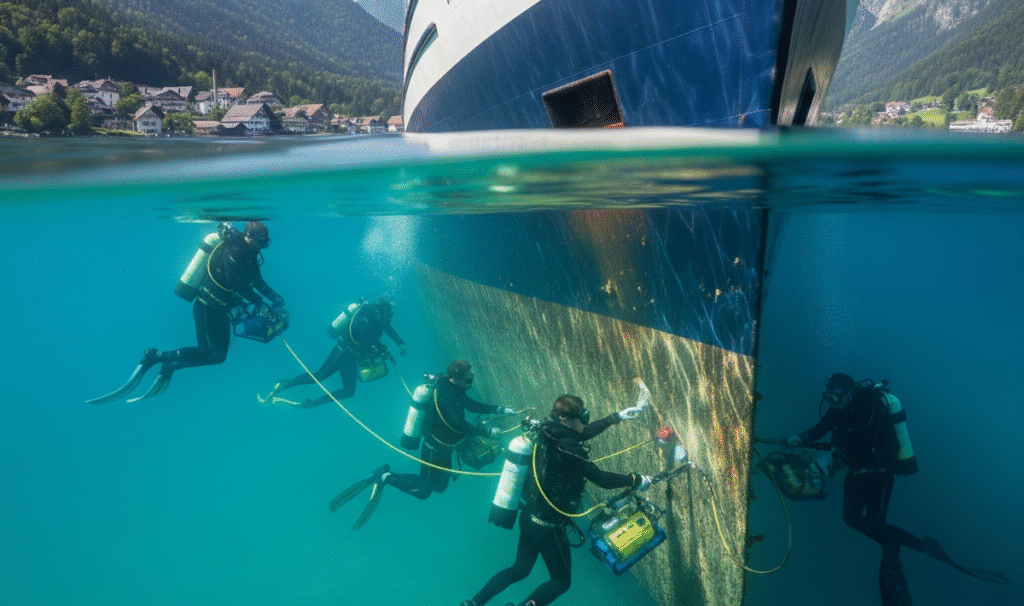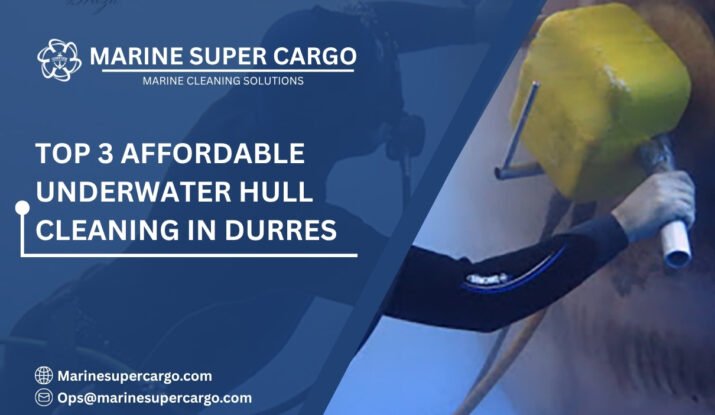When it comes to running ships efficiently, every detail matters. One of the most overlooked yet critical factors is the cleanliness of the hull. If you’ve ever tried running in muddy boots, you know how much harder it is to move forward. That’s exactly what happens to ships when marine growth attaches to their hulls. They become slower, less efficient, and more expensive to operate. That’s why regular underwater hull cleaning in Durres is not just important—it’s essential for ship owners, operators, and managers who want to stay competitive.
In this comprehensive guide, we’ll dive into why hull cleaning is such a game-changer, how the process works, its environmental and cost-saving advantages, compliance requirements, and the innovative future of this maritime service in Durres.
Why Hull Cleaning in Durres Matters
Durres is one of Albania’s busiest ports, linking trade routes between the Adriatic Sea and central Europe. With heavy traffic from cargo ships, tankers, and passenger vessels, the port experiences significant marine biofouling. When ships leave fouling unchecked, they face higher drag, increased fuel consumption, and even regulatory penalties.
By scheduling consistent underwater hull cleaning in Durres, ship operators can avoid these issues. Think of it as giving your vessel a “health check-up”—a clean hull keeps the ship agile, efficient, and compliant with international maritime standards.
The Science Behind Hull Fouling
Before we explore cleaning, let’s understand what’s happening below the surface. Marine organisms—including slime, algae, barnacles, and mussels—attach themselves to vessel hulls. This biological buildup is called biofouling.
- Soft Fouling: Slime and algae that form quickly in warm waters.
- Hard Fouling: Barnacles, mussels, and other encrustations that are tougher to remove.
A fouled hull increases water resistance (known as drag). The result? Ships need more engine power, burning extra fuel and releasing higher emissions.
Regular underwater hull cleaning in Durres acts like scrubbing dirt from your car’s windshield—you get clearer performance and safer navigation.

How Underwater Hull Cleaning Works
Step-by-Step Process
- Assessment – Divers or ROVs inspect the hull to determine the extent of fouling.
- Cleaning – Specialized tools like brushes, scrapers, and water jets are used.
- Waste Management – Responsible teams collect and properly dispose of debris to avoid local ecological harm.
- Final Inspection – Ensures coatings remain intact and surfaces are smooth.
Tools of the Trade
- Rotary brushes for slime.
- Hydraulic scrapers for growth like barnacles.
- ROV (Remotely Operated Vehicle) systems for faster and safer cleaning.
Technology now allows underwater hull cleaning in Durres to be done more effectively, minimizing vessel downtime.
Compliance with Global Maritime Rules
Hull cleaning isn’t only about saving fuel—it’s also about staying compliant. The International Maritime Organization (IMO) has stressed the link between hull fouling and invasive species transfer. The MARPOL Convention regulates ship efficiency and emissions.
By carrying out underwater hull cleaning in Durres, operators remain aligned with:
- IMO’s Biofouling Guidelines.
- MARPOL Annex VI (cutting greenhouse gas emissions).
- Regional port policies safeguarding marine ecosystems.
Failure to comply risks both fines and reputational damage. Industry frameworks from organizations like IMCA, IMO, and IAPH offer guidance for responsible operations.
Environmental Impact of Hull Cleaning
Imagine running a car with dirty oil—it pollutes faster and breaks down sooner. Similarly, shipping with a dirty hull consumes extra fuel, increasing carbon emissions.
Here’s how underwater hull cleaning in Durres supports the environment:
- Cuts down greenhouse gases by reducing drag.
- Prevents invasive species from spreading across marine habitats.
- Removes the need for harsh chemicals often used in dry-docking.
Environmentally responsible cleaning aligns with global sustainability goals, making shipping greener.
The Cost-Saving Power of a Clean Hull
Nobody likes throwing money overboard. Yet operating with a fouled hull is essentially like burning stacks of cash. Studies suggest fouling can raise fuel bills by 20–30%.
Benefits of underwater hull cleaning in Durres include:
- Lower fuel consumption and operational expenses.
- Extended life of expensive anti-fouling coatings.
- Fewer unplanned repairs or port delays.
For large commercial vessels, even a small percentage of fuel savings translates into thousands of dollars per voyage.
Cutting-Edge Innovations in Hull Cleaning
The maritime industry is evolving fast, and Durres is no exception. What once required only divers with handheld tools has transformed with robotics and automation.
New Trends
- Robotic cleaning systems – These can operate continuously without diver fatigue.
- Eco-friendly brushes – Gentle on coatings but tough on fouling.
- AI-Powered Analytics – Predictive monitoring systems alert operators when hull cleaning is needed.
Such innovations are reshaping underwater hull cleaning in Durres, making it safer, faster, and greener.
Potential Risks to Consider
Like in any maintenance task, there are risks if proper standards aren’t met. Aggressive cleaning can strip protective coatings or release fouling into surrounding waters, harming ecosystems.
Best practices suggest choosing service providers that adhere to IMCA’s diving safety guidelines and IMO-approved cleaning procedures. This ensures underwater hull cleaning in Durres provides benefits without unintended damage.
Best Practices for Ship Owners and Operators
To maximize gains from underwater hull cleaning in Durres, follow these tips:
- Keep a hull performance log after each voyage.
- Pair hull cleaning with regular propeller polishing for added efficiency.
- Choose certified local cleaning providers with strong compliance records.
- Time cleanings are strategically planned to minimize downtime.
Think of it like routine oil changes for your car—small investments that protect your bigger asset in the long run.

The Future of Hull Cleaning in Durres
With sustainability targets tightening worldwide, underwater hull cleaning in Durres is set to become a mandatory practice rather than just an option. Expect:
- Autonomous robotic cleaners are becoming standard.
- Integration of IoT and AI for real-time hull health monitoring.
- Stronger eco-regulations demanding proactive maintenance.
Shipping companies that embrace these practices will not only enjoy cost savings but also gain an advantage in meeting environmental benchmarks.
Conclusion
A clean hull is a powerful asset. From cutting fuel costs to ensuring compliance with international maritime laws, underwater hull cleaning in Durres is one of the smartest decisions ship operators can make today. Beyond the financial rewards, it’s also about playing your part in protecting oceans and securing sustainable global trade.
If you’re operating through the busy waters of Durres, the smart move is clear—keep your hull clean, efficient, and ready to sail smoothly into the future.
FAQ:
Q1. How often should ships undergo underwater hull cleaning in Durres?
Every 3–6 months is ideal, depending on vessel type, routes, and water conditions.
Q2. Is underwater hull cleaning in Durres a legal requirement?
Not directly, but it aligns with MARPOL and IMO guidelines, helping ships stay compliant.
Q3. Does underwater hull cleaning in Durres damage hull coatings?
No, when performed with modern tools and trained professionals, coatings are protected.
Q4. What’s the biggest advantage—cost savings or environmental impact?
Both matter, but for shipowners, fuel savings are the most immediate return on investment.
Q5. Are robotic cleaners available for underwater hull cleaning in Durres?
Yes, robotic and ROV-based systems are increasingly used for faster, safer, and eco-friendly cleaning.


